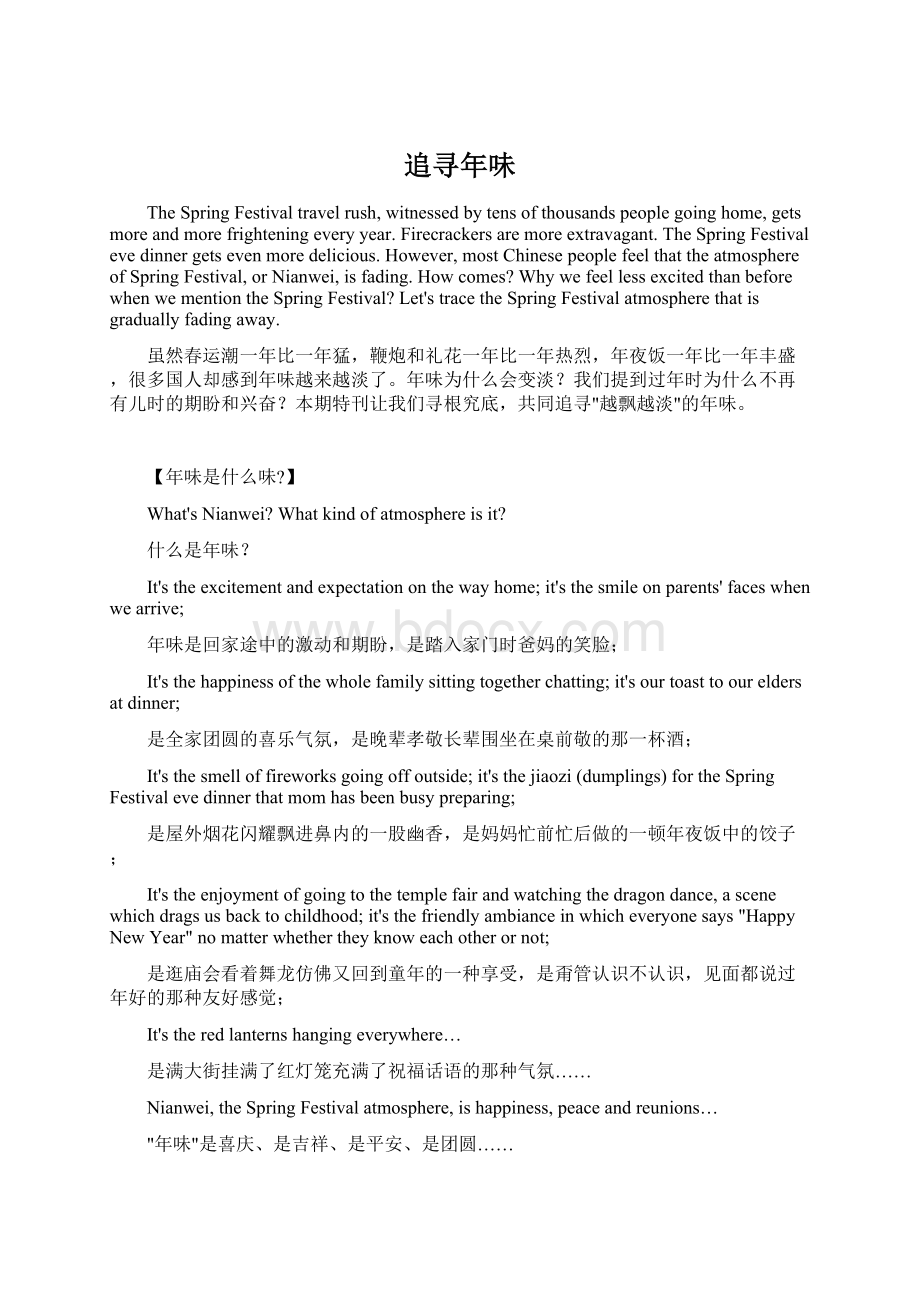追寻年味Word文档下载推荐.docx
《追寻年味Word文档下载推荐.docx》由会员分享,可在线阅读,更多相关《追寻年味Word文档下载推荐.docx(5页珍藏版)》请在冰豆网上搜索。

It'
stheexcitementandexpectationonthewayhome;
it'
sthesmileonparents'
faceswhenwearrive;
年味是回家途中的激动和期盼,是踏入家门时爸妈的笑脸;
sthehappinessofthewholefamilysittingtogetherchatting;
sourtoasttooureldersatdinner;
是全家团圆的喜乐气氛,是晚辈孝敬长辈围坐在桌前敬的那一杯酒;
sthesmelloffireworksgoingoffoutside;
sthejiaozi(dumplings)fortheSpringFestivalevedinnerthatmomhasbeenbusypreparing;
是屋外烟花闪耀飘进鼻内的一股幽香,是妈妈忙前忙后做的一顿年夜饭中的饺子;
stheenjoymentofgoingtothetemplefairandwatchingthedragondance,ascenewhichdragsusbacktochildhood;
sthefriendlyambianceinwhicheveryonesays"
HappyNewYear"
nomatterwhethertheyknoweachotherornot;
是逛庙会看着舞龙仿佛又回到童年的一种享受,是甭管认识不认识,见面都说过年好的那种友好感觉;
stheredlanternshangingeverywhere…
是满大街挂满了红灯笼充满了祝福话语的那种气氛……
Nianwei,theSpringFestivalatmosphere,ishappiness,peaceandreunions…
"
年味"
是喜庆、是吉祥、是平安、是团圆……
【过年习俗】
ThereweremanytraditionsintheSpringFestivalinancienttimes.Herewelistsomeofthemostwide-spread.Howmanyarestillkeptaliveinyourfamily?
古时过年有许多习俗。
小编整理出了一些流传较广的传统习俗,来对照看看你家现在还保留了哪些?
--Cleaning:
InChinese,thepronunciationof"
尘"
(dust)and"
陈"
(stalethings)arethesame,socleaningthedustbeforetheSpringFestivalevemeanskickingpovertyandbadluckoutofthehouse.Thetraditionembodiespeople'
shopetobidfarewelltotheoldandusherinthenew.
扫尘:
按民间的说法,因"
与"
谐音,新春扫尘有"
除陈布新"
的涵义,其用意是要把一切穷运、晦气统统扫出门。
这一习俗寄托着人们破旧立新的愿望和辞旧迎新的祈求。
--Firecrackers:
Firecrackersdatebackover2,000years.Thecrackingsoundstheymakeareperfectforcreatingajoyousatmosphere,andthusexplodingfirecrackershasbecomeanimportantpartofcelebrations.Theyarealsothoughttobringhappinessandgoodluck.
爆竹:
其起源很早,至今已有两千多年的历史。
爆竹可以创造出喜庆热闹的气氛,是节日的一种重要娱乐活动,可以给人们带来欢愉和吉利。
--SpringFestivalcouplets:
ThetraditionofpastingSpringFestivalcoupletsondoorsoriginatedduringtheSongDynastyandbecamepopularduringtheMingDynasty.Thecoupletsarecomposedofneat,antithetic,compactandingeniouswordstodescribesocietyandexpressgoodwishes.ItisauniqueChineseliteraryform.(Seephoto)
贴春联:
这一习俗起源于宋代,在明代开始盛行。
春联以工整、对偶、简洁、精巧的文字描绘时代背景,抒发美好愿望,是中国特有的文学形式。
--Windowflower&
"
Fu"
:
Manypeopleliketousepapercuttings,knownas"
windowflowers"
todecoratewindows.It'
safolkartwithalonghistory.Mythologicallegends,operastories,flowers,birds,insectsandfishcanallprovideinspirationforapapercutting.TheChinesecharacter"
福"
meansgoodluckandfortune.Itshowspeople'
syearningforahappylife.Peopleusuallyputupaposterwiththischaracteronitturnedupsidedown,becausetheChineseword"
倒,"
whichmeansupsidedown,soundsthesameto"
到,"
or"
arrive"
.
贴窗花和倒贴"
字:
过年时人们还喜欢在窗户上贴上各种剪纸——窗花。
窗花是一门历史悠久的民间艺术,内容包括神话故事、戏剧情节和花鸟鱼虫等。
字指福气、福运,寄托了人们对幸福生活的向往。
人们通常将"
字倒过来贴,表示"
幸福已到"
福气已到"
。
--Stayingupthewholenight:
ThetraditionofstayingupthewholenightonNewYear'
sevehadtwomeaningsinancienttimes.Theoldstayeduptobidfarewelltotheoldyear,whichremindsthemtocherisheverymomentoftime.Whilefortheyoung,stayingupwasanacttoshowtheywishtheirparentsalonglife.Inmoderntimes,peoplestayupthewholenighttowardoffdiseaseanddisastersandtowishforgoodluckintheNewYear.
守岁:
古时守岁有两种含义,年长者守岁为"
辞旧岁"
,有珍爱光阴的意思;
年轻人守岁,是为延长父母寿命。
现在人们通宵守岁,则是希望光明把一切邪瘟病疫驱走,来年吉祥如意。
--NewYearpicture:
TheNewYearpictureisanage-oldfolkart.Thepictures,whichareoftenbrightlycolored,bringgoodfortuneandhappinesstothousandsoffamilies.Thecustomoriginatedfromthe"
doorgod"
thatisbelievedtoguardthedoorstohomes.ThemostimportantplacesinwhichNewYearpicturesaremadeareTaohuawuofSuzhou,YangliuqingofTianjinandWeifangofShandong.Picturesfromthe3placesareofdifferentgenres.(Seephoto)
年画:
年画是中国的一种古老的民间艺术,浓墨重彩的年画给千家万户平添了许多兴旺欢乐的气氛。
年画起源于"
门神"
中国年画三个重要产地是苏州桃花坞、天津杨柳青和山东潍坊,形成了中国年画的三大流派,各具特色。
--Imagesofdoorgods:
It'
saChinesedecorationplacedoneachsideoftheentrancetoahomeorbusinessthatisbelievedtokeepevilspiritsfromentering.Ancientpeopleconsidereddoorgodstobeasymbolofrighteousnessandforcefulnessastheythoughtthosewithspecialappearanceshadsupernaturaloruncommonabilities.
贴门神:
门神是一种传统装饰,贴在住宅或者商铺的门上,用以驱魔。
门神是正气和武力的象征,古人认为,相貌出奇的人往往具有神奇的禀性和不凡的本领。
--Collectingfortune:
ItissaidthatthefirstdayofthefirstmonthonChina'
slunarcalendaristhebirthdayofthebroom.Peoplebelieveonthisdaytheycan'
tuseabroomasitwillclearoutgoodluckandfortune.Peoplealsocan'
tpouroutwaterorthrowoutrubbishastheywilllosemoney.
聚财:
俗传正月初一为扫帚生日,这一天不能动用扫帚,否则会扫走运气、破财。
这一天也不能往外泼水倒垃圾,怕因此破财。
--PayingNewYearvisits:
ItisanimportantcustomduringtheSpringFestival.Itisawaytosaygoodbyetotheoldyearandringinthenewyearandtosendgoodwishestooneanother.
拜年:
拜年是中国民间的传统习俗,是人们辞旧迎新、相互表达美好祝愿的一种方式。
【年味变淡之个案】
>
'
Nianwei'
fadesasGranages
长辈老了'
年味'
淡了
NetizenMichelle,25,recallsthegoodolddays:
ThewholefamilyusedtosleeplatetillmiddayontheLunarNewYear'
sDay,afterstayingupwatchingtheSpringFestivalGalathenightbefore.WewouldthenpayaNewYearcalltograndmawithemptystomachs.Afterhavinglunchtogether,ourcousinswouldcamealongwithustovisitrelatives,andwecouldcomebackjustintimeforsupper.Grandmawouldmakeapleasantmeal,oneofherspecialtiesoradelicioussoup.Afterdinner,thegrown-upsgatheredaroundthetable,playingMahjongandchattingaway,whilethecousinshadagirlytalk."
25岁的网友Michelle回忆起以前过年的情景:
因为要熬夜看春晚,以前过年,我们全家睡到大年初一的中午才起床,然后空着肚子到外婆家吃饭、拜年,再和表姐妹们一起去亲戚家。
走一圈回来刚好吃晚饭。
外婆亲手做了拿手菜,还会有两碗好喝的汤。
吃完饭,大人们聊天、打麻将,表姐妹们则在一起聊悄悄话。
However,thingschangeastheeldersage.NowrelativesonlygatherforlunchatarestaurantonthefirstdayofNewYear.Somethingismissing,thoughweorder3tablesoffood.Grandma'
shealthisdeclining,whichstopsherdoingthecooking,sotheactivitiesintheeveningareallcanceled."
可是,随着长辈们的年纪越来越大,大年初一的拜年便改了形式——亲戚们聚在饭店里吃顿饭,虽然有三大桌,但总感觉比往年少了些什么。
外婆身体不太好,没办法下厨做饭,于是晚上的活动也取消了。
WorkingduringNewYear
过年无聊不如上班
Duringthe7-dayholidayforSpringFestivallastyear,30-year-oldLispent3daysintheoffice.Itwasnotobligatory,butsheaskedforit."
SpringFestivalissoboringthatI'
drathergotowork,"
shesaid.Aget-togetherofoldschoolmates,whichusedtobeheldeachyear,hasbeencanceledbecausesomanyofthemweremarried.Nowtherewasnothingtodo,soLivolunteeredtoworkwithouthesitationduringthefestivalwhenherbossaskedwhowouldliketo."
Betterthanplayingonthecomputergamesathome,afterall,"
shesaid.
春节长假7天,30岁的小李有3天在办公室里度过,而且是她自己主动申请值班。
她觉得"
春节挺无聊的,还不如上班。
小李说,假期中没事情可做,老同学各自都有了家室,往年还有安排的同学聚会今年全部取消了。
放假前领导问谁要值班时,小李便不假思索地报了名:
总比在家里玩电脑有意思。
【年味变淡之寻根究底】
WhyistheatmosphereofSpringFestivalfading?
AccordingtotheChinaYouthDaily,manyexternalfactorscontributetothechange:
theurbanandruralbinarysystem,materialabundanceandspiritualemptiness,theshockofforeignfestivals,thedevelopmentofcommunicationtechnology,thepressureofworkingandhousingandthealienationofhumanrelationships,etc.
年味为什么会越变越淡?
据《中国青年报》评论,其中有很多外部因素:
城乡分割的体制、物质的丰裕、精神生活的匮乏、外国节日的冲击、科技与通信技术的发展、现代人工作与买房的压力、人与人之间情感的淡漠……
salwayseasytofindexternalreasonstoblame,butwefailtonoticethechangewithinourselves.Eachofusisgrowingmorecomplicatedandapatheticaswegainmoreworldlywisdom.Undertheburdenofmaterialdesire,weachetogobacktoasimpleandinnocentchildhood.ShouldwebeaskingifitistheSpringFestivalwhichislosingitsflavorastheyearspass,oritisus,whoaregrowingmoreandmorenostalgic,toblame?
我们总喜欢去外部寻找原因,却没发现自己也在一天天地改变,我们的内心在变复杂、变世故、变麻木,情感贫乏,为外物所累,欲望的沟壑填不满,转而去寻找那逝去的、单纯的童年。
一年又一年,是年味太淡,还是我们对过去太留恋?
【心中不变的'
年'
Timechangesourlives,butitnevershakestheimportanceofSpringFestivalfromaChineseheart.AttachmenttotheSpringFestivalisastightandintertwinedastheChineseknot.That'
swhywewouldcomeallthewaybackhomejustforareuniondinneronNewYear'
sEve."
Nian,"
ortheSpringFestival,embodiesallourbesthopesforlife,andwillforeverremainintheheartofeveryChinese.
无论时代怎样发展,过年在我们心中的隆重始终不变,它一直是中国人的一个情结,就像那千万缠绕的中国结。
人们千里迢迢赶回家,为的就是一顿年夜饭,一个团圆。
年"
所包含的各种美好意蕴,凝聚了人们对生活、对生命的所有祝愿。
这是中国人心中永远不变的"